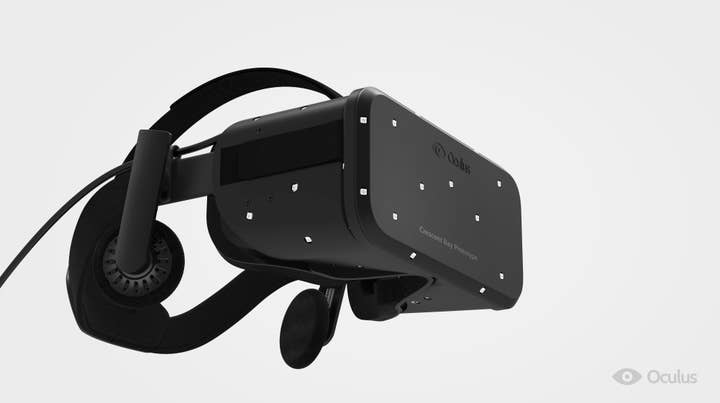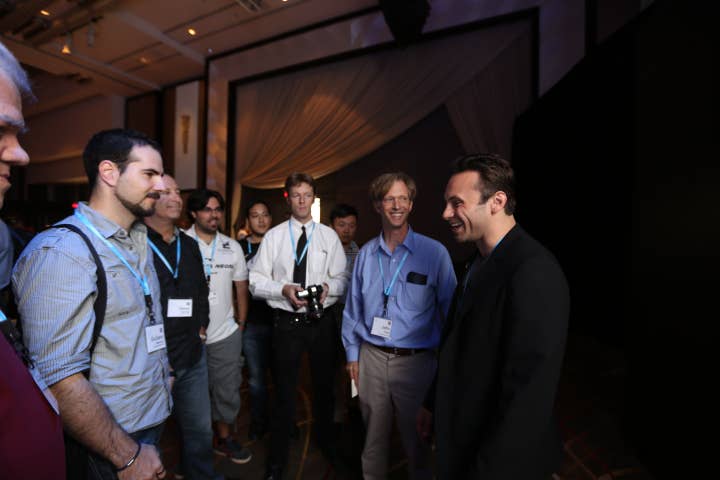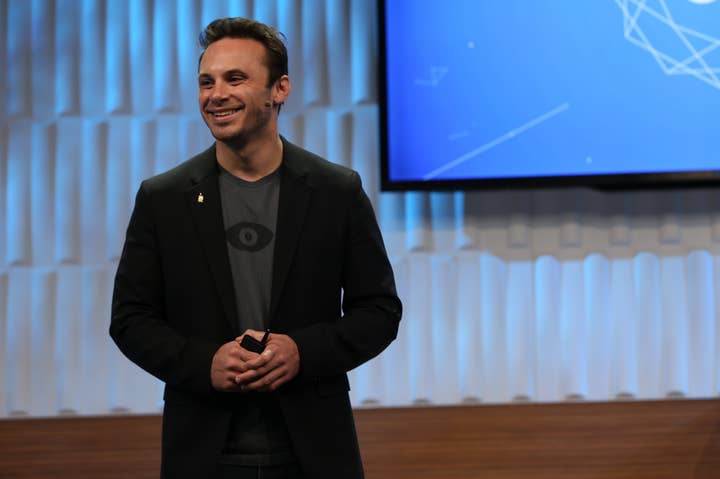Oculus CEO: We'll be remembered as the dorky looking goggles
Brendan Iribe explains why the heart of Oculus will always be gaming
"We're going to be remembered as the dorky looking goggles that people were putting on in the beginning," says Brendan Iribe with a smile, even as a Hollywood hotel swarms with people wearing Oculus t-shirts and "OMGing" about the new Crescent Bay virtual reality headset.
The Oculus VR CEO is speaking at Oculus Connect, a dedicated developer conference for the Rift and Gear VR and the unveiling ceremony for Crescent Bay. But despite the reveal, Iribe is keen to push the idea that hardware is the smallest part of the virtual reality equation.
"A lot of what will be remembered most in VR is going to be content, is going to be non-Oculus based; what you remember is Doom or Quake or one of these pieces of content, you don't remember VoodooFX. I mean you do, little hints of it, but the main memory is that experience you have," he says.
"Imagine when the Epics of the world, the Valves of the world, the EAs and all of these different game developers go out and make mind-blowing, compelling, engaging experiences. They'll make experiences that you're going to fall in love with. They'll make experiences that you actually believe are real, that you have memories of as being real places. That's never happened before. Those are going to be your strongest memories, not the black goggles that you put on."

He adds that in the future the "ski goggles" will have shrunk down to ordinary sunglasses size, removing all the barriers facing current VR. For now though, Oculus VR is making do with just improving the look of the Rift, employing experts in the field to do so.
"For a long time it was software and electrical engineers designing the Rift. Now that we have the Carbon Design Group, we actually have real industrial designers and we have the backing of Facebook to go out there and work with really great industrial design groups... yeah, I think it will become better looking."
I mention to Iribe that as I've wandered the conference I've heard all types of ideas - outside the realm of games - for how the technology could be used, from therapy and medical applications to advertising and retail.
"This is born in the game market, it's going to come from this game developer team and this game developer community"
"It's going to be born in gaming but it is going to be bigger and beyond just gaming. It's going to be for virtual tourism and medical and training simulations and architecture," he agrees, but later on clarifies that the heart of Oculus will always be gaming in a very literal sense.
"It is so much more [than games] but at the same time what is really exciting is this is born in the game market; it's going to come from this game developer team and this game developer community," he explains.
"For a very long time the heart and soul of what drives virtual reality is going to be a videogame 3D engine. This is not a film, this is a 3D game engine inside. So even when it's a medical simulation experience or it's architecture or whatever it is, it is a 3D game engine running inside. That's awesome, that is rooted in the game market."
"I think it always will have its roots in gaming. And you can't take it away, it only works from this 3D game engine. It's awesome."

Oculus VR shows its gaming roots with some of the talent its attracted to work at the company. Frankly, many of the people who joined its ranks are the closest thing the industry has to celebrities. Doom creator John Carmack, Valve's business guy Jason Holtman, Halo art director Adrian Wong, Activision's Laird M. Malamed, co-founder of Naughty Dog and former president of THQ Jason Rubin, ex-Valve virtual reality specialist Michael Abrash to name but a few.
“We like to joke inside that 'presence' is the best recruiting tool of all time. Nothing has ever been as strong. As soon as you put on the headset and you get them that quality and they get up and you're like 'so now what do you think?' very few people have decided not to join after having that experience. It really is that powerful,” he says with a smile that suggests this is pretty much exactly how all those big names have come to work with the company. But he's magnanimous about the people, who of course he won't name, that have said no.
"We like to joke inside that 'presence' is the best recruiting tool of all time"
“It's a journey that everybody is on a different path with. Some people are going to be on with Oculus, some people are going to be on with other companies, some people are going to be one with content. I mean the whole world is not joining Oculus - we would like as many great, bright people as possible - but there's a huge amount of opportunity.”
It's one that the hundreds of developers, some so young that they've had to tick a special box on the event waiver, seem to be eager to take the company up on, which bodes well for the future of the medium. It may not be as immediately accessible as the mobile or PC arenas but Iribe and his colleagues seem to be determined to change that. First though, they're concerned with converting the skeptics and wowing the fans.
“We want people to remember that the first Oculus Connect was the moment that they experienced 'presence' and really knew that VR was going to work and be huge, and be much bigger than anyone expected.”

